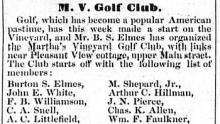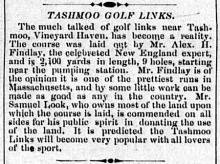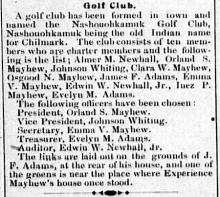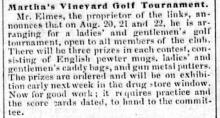The developers who recently lost their bid to build a private golf club on some 200 acres of land along the Edgartown Great Pond intend to file a new plan and try again.
“We are neither dead nor finished,” declared a letter sent to the founding members of the Meeting House Golf Club one day after the plan was voted down by the Martha’s Vineyard Commission.
The letter was sent by mail and by fax to 30 seasonal residents of the Vineyard who advanced some $2 million in start-up money for the failed golf course project.
On May 20 the MVC voted 7 to 6 to deny the golf club plan for the property owned by the MacKenty and Bigelow families in the rural coastal perimeters of Edgartown. The vote came after an intensive review process that went on for more than four months. The developers of the project are Rosario and Barry Lattuca, a father and son team from Natick, and Richard Friedman, a Boston real estate developer who owns a seasonal home on Oyster Pond.
The Meeting House golf project is one of two plans that have come under review by the MVC as developments of regional impact (DRIs) in recent months. A separate project, planned for the site of the old Vineyard Acres II subdivision, is still under review and is expected to come to a vote before the MVC sometime in the next three weeks. The second golf club project is located just down the road from the Meeting House project, although it is inland and not situated on the pond.
The Meeting House proposal was the subject of heated debate and also considerable opposition in the Vineyard community. When it became apparent that the commission was sharply divided on the project and that the vote might be close, Mr. Friedman and the Lattucas waged an intense lobbying campaign in an attempt to win votes. The campaign went on in earnest in the weeks and days leading up to the vote, and continued right up until a few hours before the climactic MVC meeting.
This week, as the project developers revealed their intention to file a new plan, it was apparent that the lobbying campaign was still in full force.
In the letter to the founding members, Bernie Fowler, the membership manager for the project, reported that the impetus to file a new plan had in fact come from members of the commission themselves.
“We have been encouraged by a number of the commissioners (including some commissioners who voted against us) to reapply immediately with plan changes,” Miss Fowler wrote. She continued:
“The commission lauded our integrity, our science and our community benefits package. We had the support of the most rational and experienced commissioners but lost because of emotional and unscientific arguments.”
Referring to a late ruling from the state ethics commission that barred MVC member Benjamin Hall Jr. from voting on the project, Miss Fowler revealed that the developers appeared to know ahead of time that Mr. Hall favored the project, even though he had never made any public statements about his position on the project.
“Our vote was also impacted when yesterday a supportive commissioner was asked to recuse himself. . . . We can reapply without prejudice or penalty and we intend to do so in a few days. We will be responsive to the commission’s concerns as we push for a majority vote in the next round,” Miss Fowler wrote.
The letter also openly questions the viability of the Vineyard Acres II golf course project, casting a shadow of doubt across whether the developers for that project can be successful in replacing a set of conservation restrictions on the property with a second set of restrictions encompassing a larger area of land.
The Edgartown conservation commission has already voted to support the proposed change in conservation restrictions.
In the letter to the Meeting House founding members, Miss Fowler writes: “We think it is not time to quit or despair, but to stay the course and fight for what is right and good. . . . We wish this was a victory vote but we believe that persistence, planning and staying together will prevail.”
Reached by telephone yesterday, Rosario Lattuca confirmed that his team will file a new plan.
“We want to get back in, hopefully within the next month,” Mr. Lattuca said.
Echoing some of the language in Miss Fowler’s letter, Mr. Lattuca questioned some of the judgment behind the MVC vote.
“I think it was emotional, and I think these other golf course projects are affecting them [the members of the commission], and hopefully now we can get this approved,” he said. “I think this is a great piece of property and a great place for a golf course.”
At its regular meeting last week the commission voted to approve a draft version of its written decision to deny the project.
In clear language, the written decision lays out a detailed set of reasons for the denial.
The decision reads in part: “The commission has long been concerned with the protection of the ecologically fragile areas of the Island, particularly where those areas are unique habitats for plant and animal species. Similarly, the commission has long been concerned with the maintaining of shore edges, wetlands and water quality of the surface waters of the Island. Additionally, the commission has been concerned with the preservation of the visual appearance of the Island, which includes both its rural character and vistas.
“The proposed development — both in its location and its magnitude — implicates each of the long-standing concerns of the commission.”
The decision also finds: “There is nothing essential for the Island in the development of the property into a golf course and associated facilities, nor is there anything especially appropriate about the conversion of active (until recently) farmland into a highly manicured recreational facility.”
The decision details the inappropriateness of the proposed disease and pest control methods so close to the Great Pond, and it notes that the project is not consistent with the protective regulations in the property’s district of critical planning concern (DCPC). The decision also finds that that the golf course plan contradicts many of the key objectives laid out in both the Regional Island Plan and the Edgartown master plan.
Mr. Lattuca said yesterday that he had not read the written decision.
“We have to take a look at it,” he said.









Comments